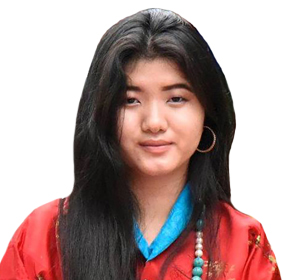There I was, standing in the corner of my high school atrium, fascinated by the diverse faces of students as they talked animatedly amongst themselves. Never before had I found myself amidst such a crowd, and to say that I felt out of place was an understatement. I found myself moving deeper into the corner when suddenly, a tall man adorned in small hoop earrings and polarised cycling shades introduced himself as my homeroom teacher. His flamboyant appearance was a stark contrast to the modestly-clad teachers I was accustomed to. Soon after, he ushered us to our homeroom, where I was formally introduced to my classmates. During my two years at Prem Tinsulanonda International School, I experienced many things for the first time in my life: living away from home, interacting with people from various countries, and learning about their culture and communities. Likewise, my friends learned to say kuzuzangpo and kadrinche, they grew to love kewa datshi and waiwai with shakam ezzay, and some even visited Bhutan after high school. Gradually, I started to find my place at Prem.
My study abroad experience was culturally and academically enlightening. I was able to see our education system from a different angle. For instance, in my Dzongkha class, we did a literary analysis of Dzongkha literature, namely Gyalsey laklen and Ashi Nangsa. We also read works by foreign authors and analyzed them in Dzongkha. I had never taken these approaches in my Dzongkha classes before and it made me see these works from more than just a moral standpoint. My courses were challenging, but they prompted me to think critically and creatively; I was encouraged to become more inquisitive and open-minded. Prem's progressive pedagogy employed laboratory research, online simulations, and graphical analyses that facilitated theoretical learning and prepared me for college in the US.

In high school, additional courses in the Arts and Foreign Languages were also offered. I regret not taking this opportunity but instead confining my options to STEM. Back then, I was under the notion that a successful future was restricted solely to a career in medicine, engineering, or the law. However, when I started my undergraduate degree at Hamilton College, I was unsure if I wanted to continue pursuing STEM because I felt that I had not explored any other options. My college's open-curriculum and liberal arts program allowed me to explore and finally decide on a major in chemistry and a minor in digital arts. I recognize now that the opportunities and possibilities are limitless in the 21st Century. The future is digital, and we need to evolve to adapt and thrive constantly.
I am now in my final year of college and I often find myself reflecting on my learning journey. As I do, I realize that the global and social awareness that I have gained from diverse academic and cultural exposure has prepared me to set forth a firm footing into the future with confidence. I recognize the strong values ingrained in me by the Bhutanese education system, which has taught me to treat every individual equally. Through this outlook, I gained some special relationships with people I have met so far. One such experience I recall is with my late dorm custodian, who made me a meal over summer break and said that I reminded him of his grand-daughter.
In the Royal Kasho on Education Reform, His Majesty relayed that education is an indispensable national priority. In Bhutan, free education up to the tenth standard is a constitutional privilege for every Bhutanese. One of the revelations I had, while I was abroad was that quality public education is not a norm elsewhere, and as Bhutanese, we must be grateful for this opportunity and make the best use of it. Our education system perfectly incorporates cultural and moral values, and Bhutanese traditions; however, we need to integrate technology and research-based learning in classrooms. I was beyond grateful to His Majesty for his extraordinary vision in recognizing the shortcomings in our education system. The reforms suggested would ensure an education system that is equally reflective of the progressive and competitive world. I pray that His Majesty’s vision translates into reality to take Bhutanese students to greater heights in the future.


